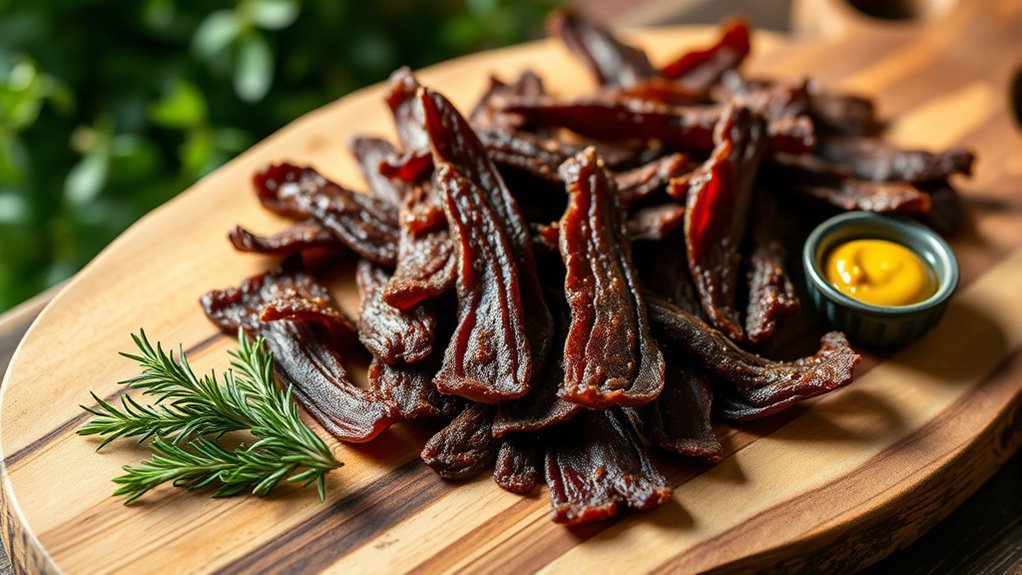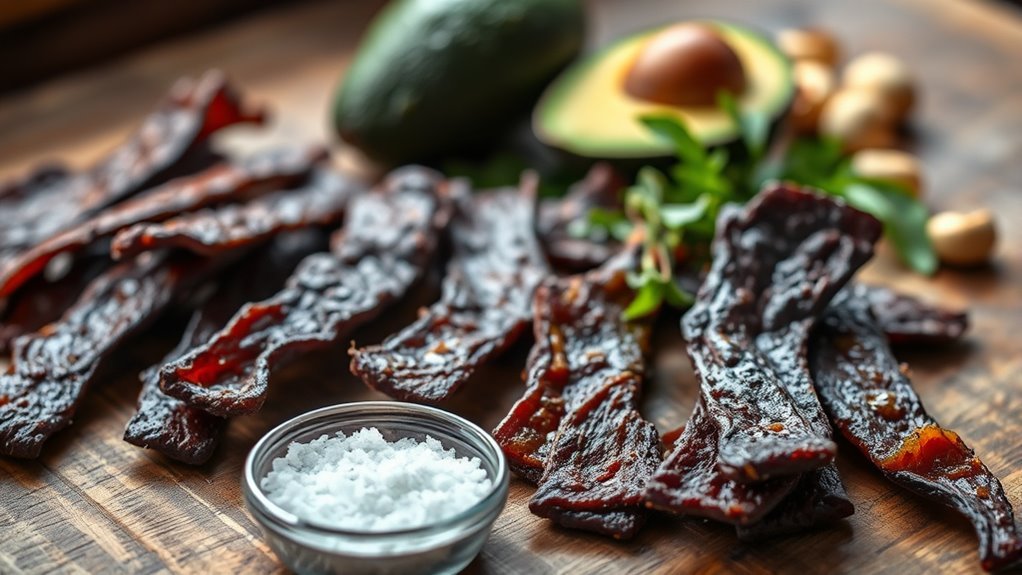Yes, jerky can be keto-friendly if you choose the right type. Look for options with low carbohydrates and minimal additives. High in protein, jerky can boost your intake while satisfying savory cravings. Avoid those with hidden sugars or preservatives that can interfere with your dietary goals. Natural sources like grass-fed beef or free-range chicken are best. You’ll discover more about incorporating jerky into your keto meal plan and the types to choose from.
Understanding the Keto Diet

When you’re exploring the keto diet, it’s important to understand its fundamental principles. The keto basics revolve around drastically reducing carbohydrate intake while increasing fats, aiming for a state of ketosis. This metabolic state allows your body to burn fat for fuel instead of carbs. Achieving a proper macro balance is vital; typically, about 70-75% of your calories should come from fats, 20-25% from protein, and only 5-10% from carbohydrates. This shift can lead to weight loss and improved energy levels. However, it’s important to approach the diet mindfully, ensuring you’re getting enough nutrients. Remember, everyone’s body responds differently, so it’s worth experimenting to find what works best for you while maintaining that sense of freedom in your food choices.
The Nutritional Profile of Jerky

When you consider jerky as a snack option, it’s important to look at its nutritional profile, particularly its protein content and carbohydrate levels. Jerky is typically high in protein, making it a great choice for those following a keto diet. However, not all jerky is created equal, so comparing carbohydrate levels is crucial to guarantee it fits within your daily limits.
Protein Content Analysis
Jerky can be an excellent source of protein, often containing around 10 to 15 grams of protein per ounce, depending on the type and brand. This high protein content makes jerky a popular choice among those seeking convenient protein sources. The protein in jerky is also rich in essential amino acids, which are crucial for muscle repair and overall health. Unlike some plant-based protein sources, jerky provides a complete amino acid profile, making it a valuable addition to a balanced diet. However, it’s important to choose jerky with minimal additives and preservatives to maximize its health benefits. By incorporating high-quality jerky into your diet, you can enjoy a tasty, protein-packed snack that aligns with your nutritional goals.
Carbohydrate Levels Comparison
In addition to being a protein powerhouse, jerky’s carbohydrate content is another vital factor to contemplate for those following a keto diet. Most jerky varieties contain low carbohydrate levels, typically ranging from 2 to 5 grams per serving. This makes jerky a favorable snack compared to other carbohydrate sources like bread or sugary snacks. However, it’s important to check the nutrition labels, as some flavored or sweetened jerky can have higher carb counts. Always be mindful of added sugars or fillers that can sneak into your favorite brands. By selecting options with minimal carbs, you can enjoy jerky as a convenient, keto-friendly snack while maintaining your dietary goals.
Types of Jerky: What to Look For

When choosing jerky, it’s essential to check the ingredients for any unwanted additives or preservatives. Pay particular attention to the sugar content, as many brands add sweeteners that can impact your keto diet. By selecting jerky with clean ingredients and low sugar, you’ll make a better choice for your health and dietary goals.
Ingredients to Consider
What should you look for in jerky to verify it fits your keto lifestyle? Focus on the ingredients and sourcing to ascertain quality and flavor without compromising your goals. Here’s what to evaluate:
- Protein Source: Opt for grass-fed beef or free-range chicken for better quality.
- Low-Carb Ingredients: Check for no added sugars or high-carb fillers.
- Natural Seasonings: Look for jerky flavors enhanced with spices, not artificial additives.
- Transparent Sourcing: Brands that share where they get their meat often prioritize quality and ethical practices.
Sugar Content Evaluation
Evaluating the sugar content in jerky is essential for maintaining a keto-friendly diet. Many jerky brands use sugar as a preservative or flavor enhancer, which can sabotage your carb count. When browsing labels, look for those that use sugar alternatives like erythritol or stevia, as these won’t spike your blood sugar levels. Always check the nutrition facts; some brands may market themselves as low-carb but still contain hidden sugars. Choose jerky that lists minimal ingredients and avoid those with added sweeteners. If you’re committed to keto, focus on brands that cater specifically to low-carb diets. By being vigilant about sugar content, you can enjoy jerky while staying true to your dietary goals.
Common Additives in Jerky
While jerky is often celebrated for its high protein content and convenience, it can also contain a variety of common additives that may impact its keto-friendliness. When choosing jerky, it’s essential to be aware of these ingredients:
- Common preservatives like sodium nitrite, which can affect health and longevity.
- Flavor enhancers such as MSG, that might not align with your dietary goals.
- Sugars or sweeteners, which can sneak in and spike carbohydrate content.
- High sodium levels, often used for flavor but can lead to water retention.
Being informed about these additives helps you make better choices, ensuring your jerky aligns with your keto lifestyle and personal health preferences. Always check the label before indulging!
Incorporating Jerky Into Your Keto Meal Plan
Incorporating jerky into your keto meal plan can be a delicious way to boost your protein intake and satisfy cravings for something savory. Jerky is not only convenient but also versatile. You can throw it into salads, mix it with nuts for a quick snack, or use it in various jerky recipes to add flavor and texture. For effective meal prepping, consider making your own jerky at home, allowing you to control ingredients and keep carbs low. Pair jerky with low-carb veggies or cheese for a satisfying meal or snack. Just remember to check labels for added sugars in store-bought options, and you’ll find that jerky can be a fantastic addition to your keto lifestyle. Enjoy the freedom of flavorful choices!
Alternatives to Traditional Jerky
If you’re looking for alternatives to traditional jerky, there are plenty of options that can still satisfy your cravings while keeping your diet aligned with keto principles. Consider these tasty alternatives:
- Vegan jerky options: Made from mushrooms or soy, they’re lower in calories and can be packed with flavor.
- Turkey jerky: It’s leaner than beef and provides several turkey jerky benefits, like higher protein and lower fat content.
- Pork rinds: Crunchy and satisfying, they’re full of healthy fats and perfect for snacking.
- Cheese crisps: Baked or fried cheese can deliver that satisfying crunch while staying keto-friendly.
These alternatives can help you enjoy your snacks without straying from your keto goals. Enjoy exploring these flavorful choices!
Frequently Asked Questions
Can Jerky Be Made at Home for Keto Diets?
Absolutely, you can make homemade jerky for a keto diet! Start with lean meats like beef or turkey, and use keto spices such as garlic powder, onion powder, or smoked paprika to enhance flavor without adding carbs. Guarantee you marinate the meat properly and use a dehydrator or oven to dry it out. This way, you’ll have a healthy, low-carb snack that fits perfectly into your keto lifestyle while enjoying the freedom of homemade treats!
Is All Jerky Gluten-Free and Keto-Friendly?
Not all jerky is gluten-free and keto-friendly. While beef jerky and many turkey varieties can fit your keto diet, you should check labels for gluten sources like soy sauce, which often contains gluten. Some jerkies may include marinades or seasonings that aren’t compliant either. Always opt for brands that specifically state they’re gluten-free, and look for those with minimal added sugars to guarantee they align with your dietary goals.
How Long Does Jerky Last on a Keto Diet?
Jerky can last quite a while on a keto diet, typically maintaining its freshness for 1 to 2 years if unopened. Did you know that properly stored jerky can retain its flavor and texture for up to 12 months after opening? The shelf life largely depends on the moisture content and preservation methods. For maximum enjoyment, always check for signs of spoilage, and store it in a cool, dry place.
Can Vegetarians or Vegans Eat Jerky on Keto?
Yes, vegetarians and vegans can enjoy jerky on keto by opting for plant-based options. There are various vegan alternatives made from ingredients like soy, mushrooms, or seitan that provide a similar texture and flavor. Just make sure to check the nutritional labels for carb counts, as some products may contain added sugars. With the right choices, you can satisfy your jerky cravings while sticking to your dietary preferences and keto goals.
What Is the Best Way to Store Jerky?
The best way to store jerky is in a cool, dry place. For ideal jerky containers, consider using vacuum-sealed bags or airtight jars. These methods help preserve freshness and prevent moisture, which can lead to spoilage. Always remember to label containers with the date, so you know how long it’s been stored. If you want to keep jerky for an extended period, refrigeration or freezing can be effective as well.
Frequently Asked Questions about Jerky and the Keto Diet
Is jerky keto-friendly?
Yes, jerky can be keto-friendly, as it is typically high in protein and low in carbohydrates. However, it’s essential to check the ingredients and nutritional information, as some brands may add sugars or fillers that increase the carb count. Opt for jerky with minimal ingredients and without added sugars to stay within your keto macros.
What types of jerky are best for a keto diet?
Beef jerky, turkey jerky, and pork jerky are popular choices for a keto diet. Look for varieties that are labeled as “no sugar added” or “low carb.” Additionally, jerky made from grass-fed or pasture-raised animals can be a healthier option, providing better nutritional profiles.
How much jerky can I eat on a keto diet?
The amount of jerky you can eat on a keto diet depends on your daily carb allowance and personal nutritional goals. Generally, it’s best to consume jerky in moderation, as it can be calorie-dense. Aim for a serving size of about 1 ounce, which typically contains around 2-5 grams of carbs, depending on the brand and flavor.
Can I make my own keto-friendly jerky at home?
Yes, making your own jerky at home is a great way to ensure it is keto-friendly. You can choose your preferred meat and seasonings, avoiding sugar and high-carb ingredients. Use a dehydrator or your oven at a low temperature to dry the meat. Homemade jerky allows you to control the ingredients and customize the flavors.
Are there any health concerns related to eating jerky on a keto diet?
While jerky can be a convenient and protein-rich snack for those on a keto diet, it is essential to consider sodium content and preservatives. Some jerky can be high in sodium, which may contribute to dehydration or high blood pressure if consumed excessively. Always opt for jerky with lower sodium options and balance your intake with plenty of water and other nutrient-dense foods.
References
- https://www.healthline.com/nutrition/jerky-keto-diet
- https://www.ncbi.nlm.nih.gov/pmc/articles/PMC6520974/
- https://www.webmd.com/diet/obesity/ss/slideshow-keto-diet
- https://www.dietdoctor.com/low-carb/jerky
- https://www.ketodietapp.com/Blog/post/2020/07/06/jerky-on-keto
- https://www.mayoclinic.org/healthy-lifestyle/nutrition-and-healthy-eating/in-depth/ketogenic-diet/art-20460303


